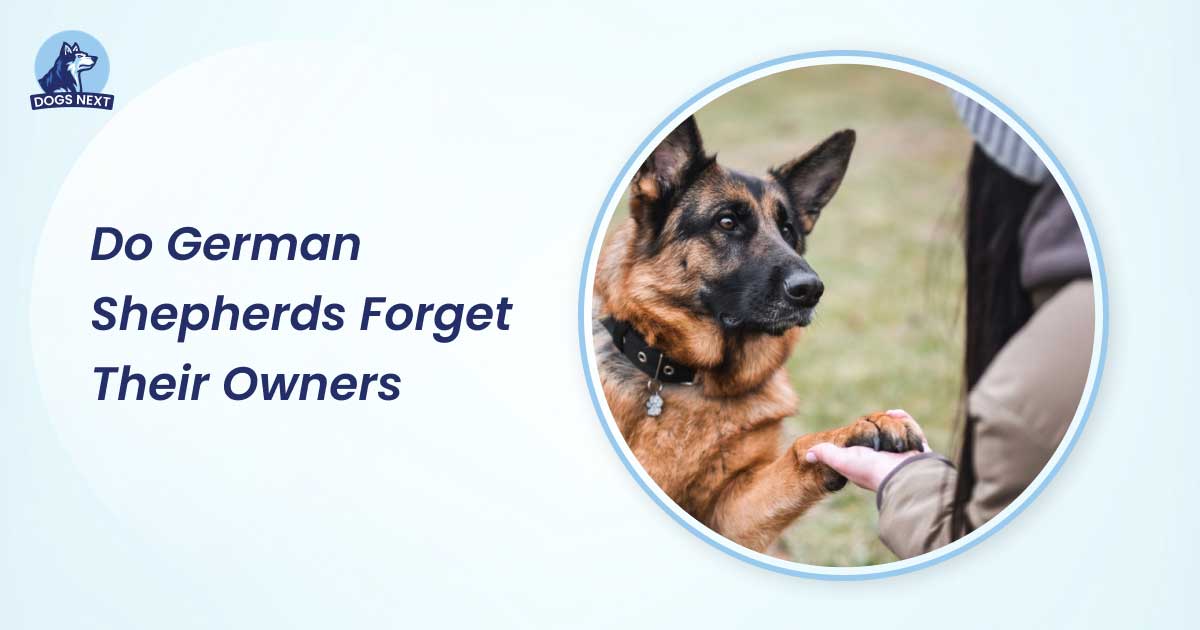German Shepherds do not forget their owners. They have excellent memories and strong bonds with their human companions.
German Shepherds are known for their loyalty and intelligence. These traits make them exceptional pets and working dogs. They form deep connections with their owners, remembering them even after long periods of separation. Their keen sense of smell and strong memory enable them to recognize familiar faces and scents.
This breed’s ability to remember and bond with their owners is one reason they excel in roles like police, search and rescue, and service dogs. Understanding their strong attachment helps in training and building a lasting relationship with these remarkable dogs.
Understanding Canine Memory
Understanding whether German Shepherds forget their owners can be complex. To grasp this, we first need to delve into canine memory. Understanding how dogs process memories helps us learn about their attachment to owners and what factors impact their memory retention.
How Dogs Process Memories
Dogs, including German Shepherds, process memories differently than humans. They rely heavily on associative memory. This means they remember people, places, and experiences through associations rather than recall.
Associative memory helps dogs remember their owners through routine actions such as feeding, walking, and playing. This memory type involves the following:
- Smells: Dogs have an excellent sense of smell. They associate specific scents with their owners.
- Sounds: Familiar voices and sounds help dogs recognize their owners.
- Visual cues: Dogs remember faces and movements, linking them to people they know.
Dog memory capacity is significant for daily activities and relationships. Despite having a different memory processing mechanism, dogs form long-lasting bonds with their owners. They may not remember exact events, but they remember feelings and associations.
Dog memory research shows that dogs can remember their owners for years, even after long separations. This suggests a robust and reliable memory system tailored to their needs.
Factors That Impact Memory Retention
Several factors influence how well dogs retain memories:
- Age: Younger dogs have sharper memories. As dogs age, their memory can decline.
- Health: Health conditions, especially neurological ones, can impact memory retention.
- Training: Regular training and mental stimulation improve memory capacity.
- Diet: A balanced diet supports overall brain health, aiding memory retention.
- Stress levels: High stress can negatively affect a dog’s memory.
Understanding canine memory involves recognizing these factors and ensuring a healthy, stimulating environment. A table highlighting how these factors affect memory can be useful:
| Factor | Impact on Memory |
|---|---|
| Age | Memory sharpness decreases with age. |
| Health | Health issues can impair memory. |
| Training | Improves memory through repetition. |
| Diet | Supports brain health and memory. |
| Stress levels | High stress can harm memory retention. |
Attachment Between Dogs And Owners
German Shepherd attachment to their owners is strong and enduring. This breed is known for its loyalty and protective nature. These traits are deeply rooted in their memory and emotional capacity.
Attachment develops through consistent positive interactions:
- Feeding and care: Regular feeding and grooming sessions foster trust.
- Playtime: Engaging in fun activities strengthens bonds.
- Training: Training sessions create mutual respect and understanding.
- Affection: Physical touch, like petting and cuddling, reinforces emotional bonds.
Dog memory research indicates that the bond between dogs and their owners is akin to a child’s attachment to a parent. Dogs rely on their owners for security and comfort, which strengthens their memory of them.
This attachment is evident through behaviors such as excitement upon seeing their owner, following them around, and showing signs of distress when separated. German Shepherds, with their keen memory and loyalty, rarely forget their owners, even after long periods apart.
Separation And Reconnection
German Shepherds are known for their intelligence and loyalty. Many dog owners worry about their pets forgetting them after a long absence. Understanding the dynamics of separation and reconnection can help ease these concerns. This article explores what happens during prolonged separation, how dogs respond to familiar scents and faces, and the joy of reuniting with a long-absent owner.
What Happens During Prolonged Separation
During prolonged separation, German Shepherds can experience a range of emotions. They might feel anxiety, loneliness, or even depression. Studies show that dogs have a strong sense of time, and they know when their routine changes. Here are some key points to consider:
- Behavioral Changes: Dogs might become less active, eat less, or show signs of stress.
- Separation Anxiety: Some dogs develop separation anxiety, leading to destructive behavior or excessive barking.
German Shepherds are highly sensitive to changes in their environment. They often miss their owners and may wait by the door or window. This behavior shows their attachment and memory.
Here’s a table summarizing common responses to prolonged separation:
| Behavior | Description |
|---|---|
| Reduced Activity | Less playing and exercise |
| Changes in Appetite | Eating less or more |
| Increased Anxiety | Signs of stress or panic |
Understanding these behaviors can help dog owners take steps to comfort their pets during absences. Providing familiar items and maintaining a routine can mitigate some negative effects.
How Dogs Respond To Familiar Scents And Faces
German Shepherds have an incredible sense of smell and memory for faces. Research shows that a dog’s brain lights up when they smell their owner’s scent. Here are some ways they respond:
- Scent Recognition: Dogs can recognize their owner’s scent even after a long time.
- Facial Recognition: Dogs remember faces and can react positively upon seeing a familiar face.
These responses are part of a dog’s memory recognition system. German Shepherds rely heavily on their sense of smell to identify people and objects. This sense is thousands of times more sensitive than a human’s.
Here’s a detailed look at their responses:
| Stimulus | Response |
|---|---|
| Owner’s Scent | Excitement, wagging tail, alertness |
| Familiar Face | Happy barking, jumping, licking |
Using familiar scents like worn clothes can comfort a German Shepherd during a dog owner separation. This helps maintain a connection despite the physical absence.
Reuniting With A Long-absent Owner
Reuniting with a long-absent owner is often a joyful and emotional experience for a German Shepherd. They usually show excitement and relief. Here are some common behaviors observed during reunions:
- Excitement: Jumping, barking, and wagging tails.
- Affection: Licking, nuzzling, and staying close.
- Relief: Sighing, relaxed body language.
These behaviors highlight the strong bond between a dog and its owner. German Shepherds have an excellent memory for people they love. This is part of their German Shepherd memory behavior. They can remember their owner even after months or years of separation.
Here’s a look at the emotional stages of a reunion:
| Stage | Behavior |
|---|---|
| Initial Recognition | Alertness, tail wagging |
| Excitement | Jumping, barking |
| Affection | Licking, nuzzling |
Understanding these behaviors can enhance the joy of reuniting. It reassures owners that their pets do not forget them. The strong bond remains intact despite the separation.
Signs Your Dog Remembers You
German Shepherds are known for their intelligence and loyalty. Many pet owners often wonder, “Do German Shepherds forget their owners?” Understanding the signs your dog remembers you can provide peace of mind. Recognizing these signs will help you strengthen your bond with your furry friend.
Excitement During Reunion
One of the most obvious signs that your German Shepherd remembers you is their excitement during reunion. When you return home after being away, observe your dog’s behavior:
- Wagging tail: A rapidly wagging tail indicates happiness and recognition.
- Jumping and barking: Your dog may jump up and bark excitedly as soon as they see you.
- Licking your face: This is a common way for dogs to show affection and recognition.
Another sign of dog reunion behavior is the way your pet’s eyes light up. Their facial expressions often change, showing a mix of joy and relief. This immediate connection showcases your German Shepherd’s strong memory and attachment to you.
Some dogs also display restless behavior before your arrival. They might sit by the door or window, eagerly waiting for you. This anticipation highlights their ability to remember your daily routine and sense your imminent return.
Recognizing Commands And Routines
German Shepherds are highly trainable and can remember various commands and routines. This ability is a clear sign of pet recognizing owner and their daily interactions. Here are some behaviors to look for:
- Responding to their name: When you call their name, they come running.
- Following commands: Commands like “sit,” “stay,” and “fetch” are quickly obeyed.
- Anticipating routines: Dogs often know when it’s time for a walk or meal.
To further illustrate, consider this table outlining common commands and routines your German Shepherd may recognize:
| Command/Routine | Dog’s Response |
|---|---|
| Calling their name | Runs towards you |
| Time for a walk | Wags tail, gets leash |
| Meal time | Waits by the bowl |
This recognition of commands and routines showcases your German Shepherd’s intelligence and their strong memory, reinforcing the bond between you.
Continuing Loyalty And Attachment
Another significant sign that your German Shepherd remembers you is their continuing loyalty and attachment. German Shepherd loyalty is legendary, and these dogs form deep bonds with their owners. Look for these behaviors:
- Following you around: They often follow you from room to room.
- Protective behavior: They may stand guard or show protective instincts.
- Seeking comfort: They come to you for reassurance and comfort.
Canine recognition behavior also includes your dog cuddling with you during quiet moments. This close physical contact indicates they feel safe and connected with you. Even after long separations, German Shepherds often display unwavering loyalty.
Dogs also show attachment by being visibly anxious when you’re not around. This anxiety can manifest as whimpering or pacing. These signs of attachment and loyalty prove that your German Shepherd has not forgotten you and continues to value your presence immensely.
Frequently Asked Questions
Do German Shepherds Have Good Memories?
Yes, German Shepherds have excellent memories. They can remember their owners and training for years.
How Long Do German Shepherds Remember Their Owners?
German Shepherds can remember their owners for many years. Their strong bond with their owners helps them retain memories.
Can German Shepherds Recognize Their Previous Owners?
Yes, German Shepherds can recognize previous owners even after long periods of separation. Their strong sense of smell and memory helps.
Do German Shepherds Get Attached To One Person?
German Shepherds often form a strong bond with one person. They are loyal, protective, and often consider one person as their primary caregiver.
Conclusion
German Shepherds are loyal and have strong bonds with their owners. They rarely forget familiar faces. These intelligent dogs remember their loved ones even after long periods apart. Their loyalty and memory make them excellent companions. Treasure your time with your German Shepherd, and they will never forget you.

I’m David, an expert contributor and writer, with two furry friends of my own, I know the challenges of raising and caring for dogs. From training to nutrition and health, my goal is to provide valuable insights and advice to help create strong bonds and happy, healthy lives. Find me in Twitter.




